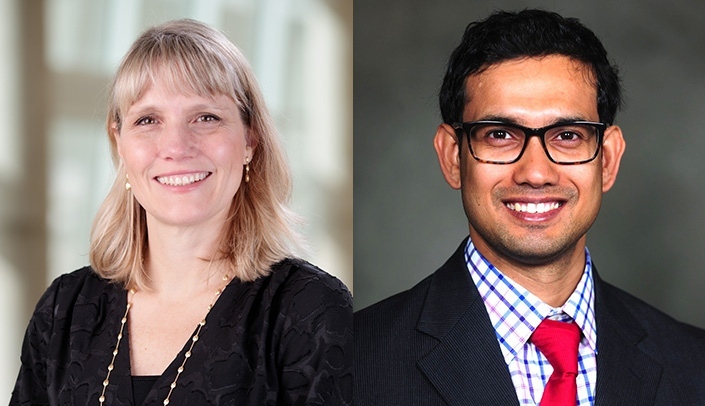A multidisciplinary UNMC team recently published a study that adds more insight into COVID-19 and some lung diseases. The paper was published July 6 online in CHEST, a prominent medical journal.
“Our goal was to determine whether Interleukin-33 (IL-33) was in the lungs of patients who did not survive COVID-19 and compare it to IL-33 expression in other inflammatory lung diseases,” said Jill Poole, MD, chief of the UNMC Department of Internal Medicine’s Division of Allergy and Immunology. She is senior author of the research letter titled, “IL-33 Depletion in COVID-19 Lungs.”
Other researchers have reported that blood levels of Interleukin-33 (IL-33) were increased at time of hospitalization for COVID-19 and that high levels predicted poor outcomes for the SARS-Cov-2 infection.
Dr. Poole said in addition to its role in allergic asthma, previous studies have shown elevated IL-33 in the blood and/or lung of those with chronic obstructive pulmonary disease (COPD) and end-stage lung disease.
A comparative analysis of lung IL-33 expression in cases of long-term effects of a temporary disease or injury, such as in COVID, are lacking and thus the impetus for the UNMC study, she said. IL-33 plays an integral role in optimal functioning of the lungs in wound repair, fibrosis, and remodeling processes. IL-33 is released inside and outside of cells following insult or damage induced by various infectious, noxious, or environmental agents.
Dr. Poole said using several UNMC bio-banks, researchers found that IL-33 was profoundly depleted – essentially absent – in the lungs of all eight COVID-19 patients who did not survive COVID-19.
“IL-33 in these COVID patients were compared to normal human lungs as well as those with COPD and chronic, progressive lung disease who had increased levels of lung IL-33,” Dr. Poole said. ”Interestingly, IL-33 levels were greatly increased in a survivor of COVID-19 who developed severe lung fibrosis (thickening or scarring) following COVID-19 infection.”
“Our study strengthens the relationship and importance of IL-33 in COVID-19, as well as its role in chronic inflammatory lung diseases,” Dr. Poole said. “We suggest that additional and longitudinal assessments throughout the COVID-19 disease process are warranted. It is important to understand the mechanisms and timing of lung IL-33 expression and regulation for promoting damage or driving wound repair processes for potential interventional strategies aimed at IL-33 in disease management.”
First author of the paper is post-doctoral fellow Rohit Gaurav, PhD. The multi-disciplinary effort involved several UNMC internal medicine divisions in addition to the departments of pathology and microbiology and the College of Public Health.
The research was collectively funded through UNMC grants and a variety of federal sources.
